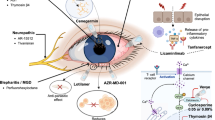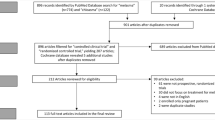Abstract
We present a meta-analysis of 12 double-blind, randomized, placebo-controlled clinical studies with betahistine in patients suffering from vestibular vertigo or Ménière’s disease, based on both published and unpublished data. The clinical endpoint we used was the investigator’s overall opinion on the response to treatment of the vertigo symptoms, after at least 1 month of treatment. We introduce a new effect parameter, the odds of a favorable treatment outcome, with the odds ratio as measure to compare the responses of betahistine and placebo patients. For each study a separate odds ratio was estimated (the study-specific odds ratio). All but one of the study-specific odds ratios were >1.0, meaning that with the new effect parameter there was evidence of an effect of betahistine on vertigo symptoms in 11 of the 12 studies. Four of the 12 studies showed a statistically significant effect in favor of betahistine compared to placebo. The meta-analytical (i.e., average) odds ratio was 2.58 (95 % confidence interval 1.67–3.99), a statistically significant result. This means that on average, the likelihood of a favorable outcome is almost two times higher for patients treated with betahistine than for placebo-treated patients. Sub-analyses conducted for patients with Ménière’s disease on one hand and with vestibular vertigo on the other hand also yielded statistically significant results. For Ménière’s disease, the meta-analytical odds ratio was 3.37 (95 % CI 2.14–5.29); for vestibular vertigo, the odds ratio was 2.23 (95 % CI 1.20–4.14). Our meta-analysis supports the therapeutic benefit of betahistine on vertiginous symptoms in both Ménière’s disease and vestibular vertigo.




Similar content being viewed by others
References
(1995) American Academy of Otolaryngology-Head and Neck Foundation. Committee on Hearing and Equilibrium guidelines for the diagnosis and evaluation of therapy in Ménière’s disease. Otolaryngol Head Neck Surg. 113:181–185
Thompson TL, Amedee R (2009) A review of common peripheral and central vestibular disorders. Ochsner J. 9:20–26
Hain TC, Uddin M (2003) Pharmacological treatment of vertigo. CNS Drugs 17:85–100
Sajjadi H, Paparella MM (2008) Ménière’s disease. Lancet 372:406–414
Dieterich M (2007) Central vestibular disorders. J Neurol 254:559–568
Lacour M, van de Heyning PH, Novotny M, Tighilet B (2007) Betahistine in the treatment of Ménière’s disease. Neuropsychiatr Dis Treat 3:429–440
Huppert D, Strupp M, Mückter H, Brandt T (2011) Which medication do I need to manage dizzy patients? Acta Otolaryngol 131:228–241
Ihler F, Bertlich M, Sharaf K, Strieth S, Strupp M, Canis M (2012) Betahistine exerts a dose-dependent effect on cochlear stria vascularis blood flow in Guinea Pigs in vivo. PLoS ONE 7:e39086
Suga F, Snow JB Jr (1969) Cochlear blood flow in response to vasodilating drugs and some related agents. Laryngoscope 79:1956–1979
Laurikainen E, Miller JM, Nuttall AL, Quirk WS (1998) The vascular mechanism of action of betahistine in the inner ear of the guinea pig. Eur Arch Otorhinolaryngol 255:119–123
Meyer JS, Mathew NT, Hartmann A, Rivera VM (1974) Orally administered betahistine and regional cerebral blood flow in cerebrovascular disease. J Clin Pharmacol 14:280–289
Tomita M, Gotoh F, Sato T, Amano T, Tanahashi N, Tanaka K, Yamamoto M (1978) Comparative responses of the carotid and vertebral arterial systems of rhesus monkeys to betahistine. Stroke 9:382–387
Krishna BA, Kirtane MV, Sangeeta T, Gopinath G (2000) Pre and post betahistine therapy 99mTc-HMPAO brain spect studies in patients with vertigo. Neurol India 48:255–259
Unemoto H, Sasa M, Takaori S, Ito J, Matsuoka I (1982) Effects et al. Inhibitory effect of betahistine on polysynaptic neurons in the lateral vestibular nucleus. Arch Otorhinolaryngol 236:229–236
Valli P (2000) Betahistine reduces the resting firing rate of vestibular receptors in the frog. Acta Otolaryngol Suppl 544:8–10
Soto E, Chávez H, Valli P, Benvenuti C, Vega R (2001) Betahistine produces post-synaptic inhibition of the excitability of the primary afferent neurons in the vestibular end organs. Acta Otolaryngol Suppl 545:19–24
Botta L, Mira E, Valli S, Zucca G, Valli P (1998) Effects of betahistine on vestibular receptors of the frog. Acta Otolaryngol 118:519–523
Botta L, Mira E, Valli S, Zucca G, Perin P, Benvenuti C, Fossati A, Valli P (2000) Effects of betahistine metabolites on frog ampullar receptors. Acta Otolaryngol 120:25–27
James A, Burton MJ (2011) Betahistine for Ménière’s disease or syndrome (review). The Cochrane Library
Della Pepa C, Guidetti G, Eandi M (2003) Betahistine in the treatment of vertiginous syndromes: a meta-analysis. Acta Otorhinolaryngol Ital 26:208–215
Whitehead A, Jones N (1994) A meta-analysis of clinical trials involving different classifications of response into ordered categories. Stat Med 13:2503–2515
Sutton AJ, Abrams KR, Jones DR, Sheldon TA, Song F (2000) Methods for meta-analysis in medical research. Wiley, Chichester
ICH E9 (1998) Statistical principles of clinical trials. (CPMP/ICH/363/96)
Brown H, Prescott R (1999) Applied mixed models in medicine. Wiley, New York
DerSimonian R, Laird N (1986) Meta-analysis in clinical trials. Control Clin Trials 7:177–188
Watanabe K, Fukami J, Yoshimoto H, Ueda M, Suzuki J (1967) Evaluation of the effect of betahistine in Ménière’s disease by double-blind test and multivariate analysis. Jibiinkoka 39:1237–1250
Frew IJC, Menon GN (1976) Betahistine hydrochloride in Ménière’s disease. Postgrad Med J 52:501–503
Wilmot TJ, Menon GN (1976) Betahistine in Ménière’s disease. J Laryngol Otol 90:833–840
Oosterveld WJ (1984) Betahistine dihydrochloride in the treatment of vertigo of peripheral vestibular origin: a double-blind placebo controlled study. J Laryngol Otol 98:37–41
Mak M (1981) Betahistine dihydrochloride and vertigo of the peripheral type: a double-blind cross-over clinical trial in out-patients. Duphar report 56638/9M/81
Mak M (1982) Double-blind cross-over multi-centre trial of SERC (betahistine hydrochloride) 48 mg daily versus placebo in outpatients with vertigo. Duphar report 56638/1M/82
Kastein ETh (1983) A double blind cross-over study of Serc (betahistine dihydrochloride), 36 mg daily, versus placebo in outpatients with vertigo. Duphar report H108.5009
Meyer ED (1985) Treatment of Ménière’s disease with betahistine dimesilate (Aequamen®)—double blind study versus placebo (cross-over). Laryngol Rhinol Otol 64:269–272
Hicks JJ, Hicks JN, Cooley HN (1967) Ménière’s disease. Arch Otolaryngol 86:610–613
Wolfson RJ, Myeres D, Schlosser WD (1967) Ménière’s disease—treatment with betahistine hydrochloride. Eye Ear Nose Throat Mon 46:891–896
Martins J (1968) New basis for control of Ménière’s disease. Eye Ear Nose Throat Digest 30:47–51
Singarelli S (1979) Studio in doppio cieco sull’efficacia del cloroidrato di betaistina nel trattamento ambulatoriale di un gruppo di pazienti affetti da vertigine di posizione e acufeni [Double blind study into the efficacy of betahistine hydrochloride in the outpatient treatment of a group of patients affected by positional vertigo and tinnitus.] Nuovo Arch Ital Otol Suppl 7:69–72
Okamato K, Hazeyama F, Taira T, Yoshida A (1968) Therapeutic results of betahistine in Ménière’s disease with statistical analysis. Iryo 22:650–666
Salami A, Delle Piane M, Tinelli E, Jankowska B (1984) Studio a doppia cecita’ tra cloridrato di betaistina e placebo nel traptament o deele sindromi Menieriformi [Double-blind study of betahistine hydrochloride and placebo in the treatment of forms of Meniere’s syndrome]. I1 Valsalva 60:302–312
Schmidt JT, Huizing EH (1992) The clinical drug trial in Ménière’s disease with emphasis on the effect of betahistine SR. Acta Otolaryngol Suppl 497:1–189
Le Gourrierec (2010) A double-blind, placebo-controlled, randomized, clinical study of the effects of Betaserc® 24 mg (1 tablet b.i.d. over 3 months) on vestibular compensation following vestibular neurotomy in patients with disabling Ménière’s disease. Solvay Pharmaceuticals report S108.4.102
Elia JC (1966) Double-blind evaluation of a new treatment for Ménière’s syndrome. JAMA 196:187–189
Burkin A (1967) Betahistine treatment of Ménière’s syndrome. Clin Med 74:41–48
Canty P, Valentine J, Papworth SJ (1981) Betahistine in peripheral vertigo: a double-blind, placebo controlled cross-over study of Serc versus placebo. J Laryngol Otol 95:687–692
Van Bemmel P (1978) Statistical analysis of the data of a double blind cross-over study of Serc and placebo in outpatients with vertigo of the peripheral type. Philips Duphar report 56663/26/78
Kastein ETh (1983) Betahistine dihydrochloride and peripheral vertigo, a double blind placebo-controlled trial in outpatients. Duphar report 77.054
Nury AM (1984) A prospectively randomized, placebo-controlled, double-blind, parallel group study of betahistine dihydrochloride in patients presenting with vertigo and central signs on electronystagmography. Duphar report 108.005 80/M
Fischer AJEM, van Elferen LWM (1985) Betahistine bij de behandeling van aanvalsgewijs optredende duizeligheid. Een dubbelblind onderzoek. [Betahistine in the treatment of paroxysmal attacks of vertigo. A double-blind investigation]. Tijdschr Ther Geneesm Onderz 10:933–937
Van Delden RAJ (1984) A multicentre randomised double-blind placebo controlled general practitioner study with betahistine (Betaserc®) in the treatment of paroxysmal vertigo. Duphar report H 108.903 NL
Ricci V, Sittoni V, Nicora M (1987) Valutazione terapeutica e tollerabilita del chloridrato di betaistina (Microser) in confronto a placebo nella malattia diMenière [Efficacy and safety of betahistine hydrochloride versus placebo in Ménière’s disease]. Riv Ital Ornitol Audiol Foniatr 7:347–350
Legent F, Calais C, Celleir D (1988) Vertiges paroxystiques itératifs et Serc: étude clinique controlée [Recurrent paroxysmal vertigo and Serc: a controlled clinical study]. Conc Méd 110:2539–2543
Cellier D (1987) Double-blind, randomised, multicentre trial comparing 8 mg Serc with placebo in patients suffering from repetitive paroxysmal vertigo with and without cochlear symptoms typical of Ménière’s disease. Duphar report H 108 022 85 F/M
Conraux C, Cellier D (1988) Les sensations vertigineuses chroniques: essai comparatif Serc 8 mg versus placebo, double aveugle randomise, multicentrique chez des patients souffrant de sensations vertigineuse chroniques. [Chronic vertiginous sensations: a comparative double-blind randomized multicenter study of serc 8 mg versus placebo in patients suffering from chronic vertiginous sensations]. Impact Médicin 260:63–65
Cellier D (1987) Multicentre, randomized, double-blind, placebo-controlled trial of Serc 8 mg in patients suffering from chronic vertigo. Duphar report H 108 023 85 F/M
Oosterveld WJ, Blijleven W, Van Elferen LWM (1989) Betahistine versus placebo in paroxysmal vertigo: a double-blind trial. J Drug Ther Res 14:122–126
Van Elferen L (1987) Multi-centre randomised double-blind cross-over study using betahistine (Betaserc®) to treat forms of vertigo suitable for drug therapy. Duphar report H 108.904
Maisonneuve H (1989) Double-blind, randomised, multicentre study to compare Serc 8 mg with placebo. Duphar report H 108 027 86 F/M
Salden JAHA (1990) A double-blind placebo-controlled study with betahistine (Betaserc) in forms of vertigo eligible for drug treatment. Duphar report H108.906 NL
KirkPatrick CT, Saunders HF (1997) Double-blind, multi-centre, randomised, comparative study of Serc® 24 mg versus placebo, in two groups of patients with recurrent vertigo. Solvay Pharmaceuticals report H.108.035.92/F
Van Elferen L, Essers HJ (1997) Analyses of patient suffering from Ménière’s disease; addendum to clinical report <double-blind, multi-centre, randomised, comparative study of Serc® 24 mg versus placebo, in two groups of patients with recurrent vertigo.> Solvay Pharmaceuticals report H.108.035.92/F.02
Mira E, Guidetti G, Ghilardi PL et al (2003) Betahistine dihydrochloride in the treatment of peripheral vestibular vertigo. Eur Arch Otorhinolaryngol 260:73–77
Jeck-Thole S, Wagner W (2006) Betahistine: a retrospective synopsis of safety data. Drug Saf 29:1049–1059
Conflict of interest
The author is an employee of Abbott, a company that markets betahistine dihydrochloride.
Author information
Authors and Affiliations
Corresponding author
Rights and permissions
About this article
Cite this article
Nauta, J.J.P. Meta-analysis of clinical studies with betahistine in Ménière’s disease and vestibular vertigo. Eur Arch Otorhinolaryngol 271, 887–897 (2014). https://doi.org/10.1007/s00405-013-2596-8
Received:
Accepted:
Published:
Issue Date:
DOI: https://doi.org/10.1007/s00405-013-2596-8




